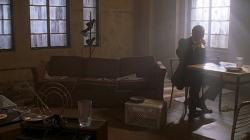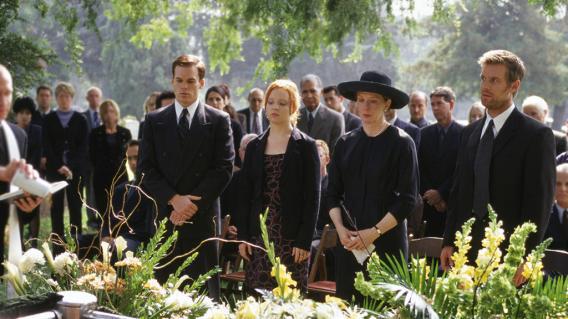Summer is here, the perfect time to catch up with a few of those shows everyone is always saying you should watch. But there are so many! How can you decide which to try? You need to find the gateway episode, one you can watch without any background knowledge and which will give you a real sense of the show—and whether you’ll like it.
In my internship-filled, under-employed year after college, I had a lot of time to do all the things I meant to do while still in school but never got around to. Namely: watch lots of TV. The two big shows I knew I had to watch were The Wire and The Sopranos—those were a given, a necessary rite of passage that I had neglected. I had already watched the first HBO antihero show, Sex and the City, many times over. And after those three series I thought my HBO education was complete.
You see, no one told me about Six Feet Under. And I blame both my friends and favorite publications (including this one), because while they were busy extolling other, admittedly great shows, Six Feet Under was woefully neglected as soon as it went off the air. I finally realized this last month when, in the heart of summer, I watched all five seasons and then, immediately following the finale, sat on my floor and cried.
Maybe I need new friends (or friends like Vulture’s Margaret Lyons). But you don’t. You have me. And I’m telling you to go watch Six Feet Under—specifically, to test the waters, Season 1, Episode 6: “The Room.”
Say what you will about the great cold opens of Breaking Bad, but each Six Feet Under episode starts with what is essentially a short film. More often than not, we enter in the middle of a scene where characters we’ve never seen before are living their lives. The hook? We, the viewers, know that one of them is going to die. Sometimes it’s obvious who it will be (the person lying on a hospital bed, say), sometimes it’s not (like in this one, which takes a crazy turn, just 35 seconds in). These typically two-minute scenes then fade to white (the show is all about fading to the light, rather than darkness) and lists the recently deceased’s name and the year of birth and death. These now-dead characters that we were just introduced to can serve as major foils in the episode’s plot or as mere grace notes.
“The Room” opens with an older couple lying in bed; the husband, Mr. Jones (Bill Cobbs), wakes up because it’s cold, and starts lovingly complaining to his wife of more than 50 years—only to find out, after she doesn’t respond, that she’s died. So he goes to the funeral home run by the Fishers, the family at the center of Six Feet Under. The Fishers are always dealing with death, but they are having difficulty dealing with the death of one of their own: In the show’s pilot, Nathaniel Fisher, the family patriarch played by the great Richard Jenkins, is hit by a bus while driving a hearse. He appears sporadically throughout the series as … a ghost? His family’s conscience? The father he never was?
Nathaniel is survived by two sons, a daughter, and his wife. Nate (Peter Krause) fled the family business as soon as possible and started a new life running a co-op in Seattle. David (Michael C. Hall) is, when the show begins, a closeted and order-obsessed gay man who stuck around to run the family business. Claire (Lauren Ambrose) is the neglected younger sister who is just trying to get through high school. Their mother is Ruth, played by the incomparable Frances Conroy. There’s something about the way Ruth speaks, her careful consideration of words that she then just spurts out, that’s utterly captivating. Her way of speaking in short declarative sentences feels almost Hemingway-esque—if Hemingway were a red-headed, middle-aged housewife who didn’t know anything about her children and had a borderline inexplicable sex appeal.

HBO
These characters somehow avoided really getting to know each other before Nathaniel’s death. And, as Nate learns in “The Room,” they didn’t really know Nathaniel either: While trying to pay for an oil change, Nate discovers that his father made deals all over town in which he traded goods and services for funerals. Nate then looks over the funeral home’s books and sees that various funerals were paid for with things other than money. In one case, his father buried a restaurateur in exchange for free use of a spare room above the restaurant. Nate visits the room and tries to figure out what exactly his dead would have done there, leading to a great montage in which Nathaniel plays cards, dances to “Journey to the Center of the Mind,” gets high with some heavily tattooed bikers (he also, Nate has learned, traded a funeral for a steady supply of weed), gets blown by a prostitute, and finally, surreally, shoots people from the window. (The characters’ imaginations on this show are pretty intense: In other episodes they envision their own deaths, other people’s heads exploding, and their parents in compromising positions.)
Nathaniel is not the only loved one whom Nate realizes he doesn’t know. His new girlfriend Brenda (Rachel Griffiths) turns out to be the inspiration for Charlotte Light and Dark—a book about a super-intelligent girl who mocks her psychiatrists by barking instead of talking and pretending she was raped, among other things. This book is beloved by many in the world of the show, including Nate’s younger sister, who, on her own time, hooks up with Brenda’s bipolar brother Billy (Jeremy Sisto).
Throughout the episode, Mr. Jones, the man who’s lost his wife, is brutally honest, saying what he thinks and what he feels, something all the other characters in the show have a hard time doing. His raw emotion highlights all the unexpressed feelings around him—and, essentially, what it really means to be part of a family. The episode ends with Mr. Jones, leaning on his wife’s coffin. Head rolling down. Dead. Fade to white.
There’s a lot more in this episode that I could discuss. I haven’t told you about my love for David, truly the pillar of the series, and his on-again-off-again boyfriend Keith (Mathew St. Patrick), who isn’t even in this episode. There’s also my theory about how Six Feet Under was the perfect, accidental post-9/11 show (the pilot aired on June 3, 2001). The only thing I knew when I started watching was that it had the best TV ending ever. So I had been told—correctly. This is not an issue of dispute; I’m actually crying at my desk right now thinking about it. If, by some miracle you don’t know how it ends, I won’t spoil it here, but, when you do finish and get off up the floor, give me a call. We’ll have lots to talk about.
Read about the Gateway Episodes for The Sopranos, Sex and the City, Buffy the Vampire Slayer, and more.
